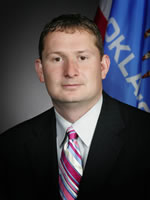In order to provide equal access and equal opportunity to people with diverse abilities, this site has been designed with accessibility in mind. Click here to view
A More Cautious Approach for Oklahoma
 Sen. Kenneth Corn
Sen. Kenneth Corn
The United States is in the midst of what well may be the worst economic crisis since the 1929 crash on Wall Street which forced millions of Americans into poverty, hunger and despair. The home lending debacle has been snowballing for months, and the domino effect is devastating economies throughout the nation.
Here in Oklahoma, we’ve been fortunate—and some have claimed, even recession-proof. The main reason our state is in better financial state is due to high energy prices. But those of us who remember the oil bust of the 1980’s know far too well how dangerous it is to build budgets on high energy prices that could easily fall drastically within a short time.
Admittedly, the prices have climbed ever higher in the last three years, but a closer analysis shows why we need to be extremely cautious. In January of 2005, the average price per barrel was $45.23. By that September, it was $63.19. It had climbed as high as $71.29 by July, 2006, but six months later it was $51.29.
This year, we’ve seen prices reach record levels—up to $140 a barrel this summer, but then prices have fallen dramatically in the last couple of months. How might the current economic crisis ultimately impact oil prices in the long run? What if we had another major terrorist attack? The recession and low energy prices following September 11, 2001, resulted in a $427 million shortfall by 2003. That shortfall was felt throughout every area of state government, from education to nutrition services for our seniors. We would be foolish to think Oklahoma will always be immune from economic downturns and recessions, and even more foolish still to think energy prices will never fall again.
For the past two years, I have called for the legislature to allow voters to decide a constitutional amendment to require certification of the 10-year average of gross production tax revenue and limit appropriations of revenues over that amount to one-time expenditures. I plan to re-introduce the measure for the 2009 legislative session.
If approved by the legislature and the voters, this proposal would provide greater stability in the state budget, as well as greater security for Oklahoma citizens. The gross production revenue exceeding the 10-year average could be spent for vital capital needs, including repairing dangerous roads and bridges. The excess funds could not be spent for recurring expenses, such as operational costs for state agencies and services.
I first introduced my proposal during the 2007 legislative session, but it was not heard. Before the 2008 session, I once again called for the measure to be heard. In a press release from January 8, I cautioned that economist were warning that a recession was possible—those warnings now appear to be true.
It is a recipe for disaster to base recurring expenditures on something that fluctuates as much as energy prices—and that’s what happened during the oil boom. We cannot afford to repeat those mistakes. My proposal will help ensure we do not.
 Oklahoma Senate
Oklahoma Senate

